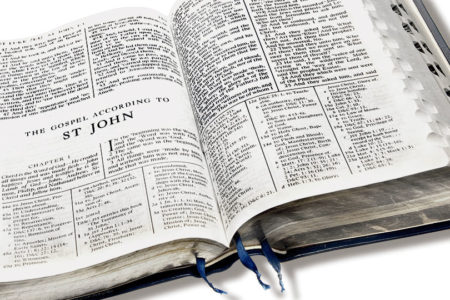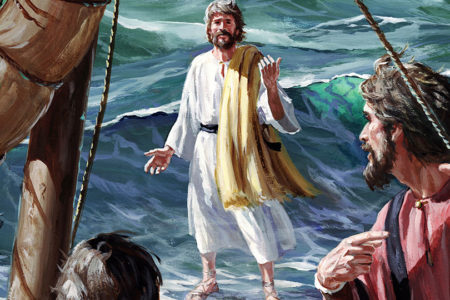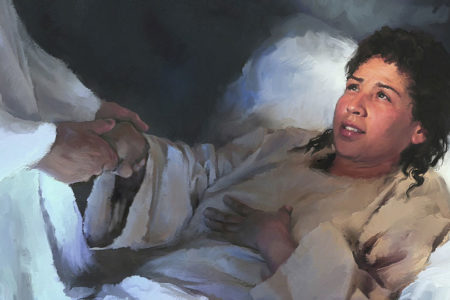Can Three Be One?
Christians are often accused of worshiping three gods. Admittedly, the truth of a triune (three in one) God is a difficult, if not impossible, concept to grasp. God is not like humans. So every attempt to explain Him falls short.
Yet Christians worship only one God: the God of Abraham, Isaac, and Jacob—the God of Israel. The biblical reality is that He exists as three separate but equal Persons: the Father, Son, and Holy Spirit.
Some have tried to explain this concept using H2O, which can exist as a solid (ice), liquid (water), and gas (steam). Others use an egg, which is made up of three distinct parts yet is one, or a three-leaf clover. All these attempts seem good on the surface but break down when trying to explain the triune Godhead.
No one can truly explain the Trinity. We know Jesus is God, yet He is not the Father. Nor is He the Spirit. The Father is God, yet He is neither the Son nor the Spirit; and the Spirit is God, yet He is not the Son or the Father.
However, both the Hebrew Scriptures and the New Testament support the triunity of God.
The prophet Isaiah wrote, “Listen to Me, O Jacob, and Israel, My called: I am He, I am the First, I am also the Last. Indeed My hand has laid the foundation of the earth, and My right hand has stretched out the heavens” (Isa. 48:12–13). The One speaking identifies Himself as the eternal Creator of the world.
The speaker continues, “Come near to Me, hear this: I have not spoken in secret from the beginning; from the time that it was, I was there. And now the Lord Gᴏᴅ and His Spirit have sent Me” (v. 16).
So the speaker clearly is God. Yet He says “the Lord Gᴏᴅ and His Spirit” sent Him. The three persons of the Godhead all appear in this verse: The One being sent is God, and the Ones doing the sending are God. Together, they constitute the true and living triune God of Israel: “And now the Lord Gᴏᴅ [the Father], and His Spirit [the Holy Spirit], have sent Me [the Son].”
Isaiah then identified the speaker: “Thus says the Lᴏʀᴅ, your Redeemer, the Holy One of Israel: ‘I am the Lᴏʀᴅ your God’” (v. 17). The speaker is the Redeemer, the Messiah.
More than 700 years later, the apostle John received specific revelation concerning the end-times. The risen Messiah declared to Him, “‘I am the Alpha and the Omega, the Beginning and the End,’ says the Lord, who is and who was and who is to come, the Almighty’” (Rev. 1:8). The speaker here is Jesus, the Redeemer—the Messiah and second Person of the triune Godhead, the same One who spoke in Isaiah 48:16.
Scripture ascribes the act of creation to Him: “He is the image of the invisible God, the firstborn over all creation. For by Him all things were created that are in heaven and that are on earth, visible and invisible….All things were created through Him and for Him…who is the beginning, the firstborn from the dead, that in all things He may have the preeminence” (Col. 1:15–16, 18).
Also, “All things were made through Him, and without Him nothing was made that was made” (Jn. 1:3).
Like Judaism, Christianity is monotheistic. The reality is that God is a plurality in His oneness.
The creedal statement of Judaism, the Shema, allows for this plurality: “Hear, O Israel: The Lᴏʀᴅ our God, the Lᴏʀᴅ is one!” (Dt. 6:4). The Hebrew word translated “one” is echad, which denotes a plurality within a unity.
It is used to refer to a single day that consists of evening and morning (Gen. 1:13). It is also used to describe the marriage union: “A man shall leave his father and mother and be joined to his wife, and they shall become one [echad] flesh” (2:24).
When the Israelite spies returned from the Land of Promise to report to Moses, they brought from the “Valley of Eshcol…one [echad] cluster of grapes” (Num. 13:23). It was a single cluster composed of many.
Because God is triune, He could come to Earth as a Baby in the Person of Jesus, yet still sit on His throne in heaven. Many find this truth difficult to grasp. But God is omnipotent and omnipresent; and with Him, nothing is impossible.








